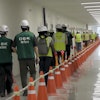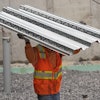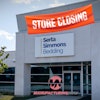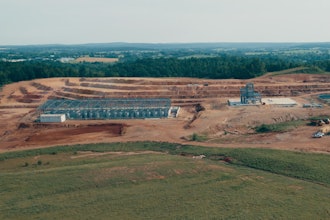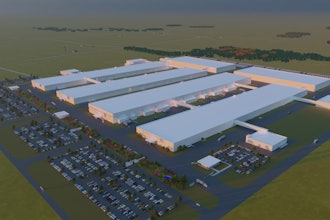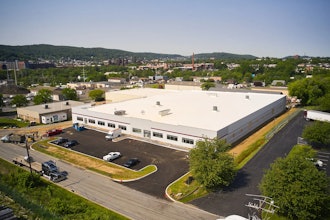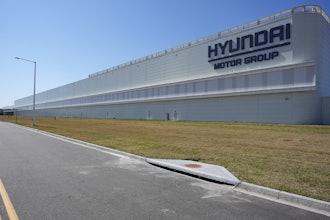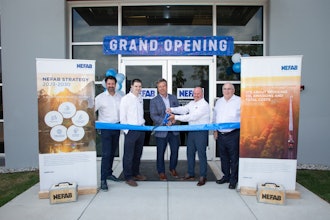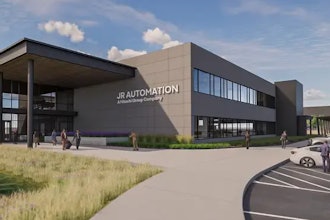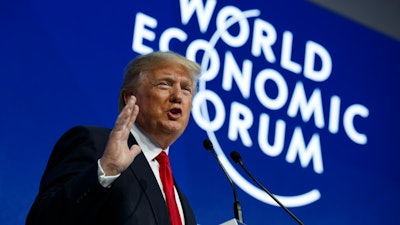
DAVOS, Switzerland (AP) — Declaring that America is open for business under his leadership, President Donald Trump told a gathering of political and business elites on Friday that the economic growth taking place in the U.S. due to his "America first" agenda also benefits the rest of the world.
Trump told the World Economic Forum in Davos, an incongruous location for a nationalist president, that American prosperity has created countless jobs around the world, but stressed that his priority would always remain on protecting the interests of within his nation's own borders.
"As president of the United States, I will always put American first just as the leaders of other countries should put their countries first," said Trump.
But the president tried to strike a balance, tempering his nationalist agenda with reassurances to the globalist and cooperation-minded audience that his protectionist vision "does not mean America alone."
"When the United States grows, so does the world," Trump said. "American prosperity has created countless jobs around the globe and the drive for excellence, creativity and innovation in the United States has led to important discoveries that help people everywhere live more prosperous and healthier lives."
As Forum chairman Klaus Schwab introduced Trump, he drew some hisses when he said that the president could be subject to "misconceptions and biased interpretations." When Trump took the stage, he received modest applause but some people kept their hands at their sides. The crowd was largely subdued as the president spoke but there were boos when Trump took a swipe at the media.
Once more shadowed by revelations back home about the ongoing Russia probe, Trump showcased the country's roaring economy and made a pitch to the world leaders that "America is open for business and we are competitive once again."
The gathering had viewed Trump with skepticism, given his "America First" message, but the White House has insisted that his protectionist policies and international cooperation can go hand-in-hand.
Trump addressed the crowd of over 1,500 people packed into a high-ceilinged hall in the modern conference center. Anticipation was high from attendees, who have watched the president closely since he arrived, snapping photos when he entered and as he moved from room to room.
Trump hit some of the same nationalist notes that have become hallmarks of his other speeches to international gatherings, calling for secure borders, stricter immigration policies and enhanced national sovereignty, saying that each nation should put its own economic interests ahead of the larger multi-national partnerships.
"We support free trade but it needs to be fair and it needs to be reciprocal," said Trump, who has long expressed a preference for one-to-one national trade deals rather than regional ones. But he also left the door open to re-entering the Trans Pacific Partnership, a sweeping trade deal from which he withdrew a year ago, saying that "perhaps" the United States could resume negotiations with many of the participating countries at once.
As if making a salesman's pitch, Trump repeatedly boasted about the nation's economy and pushed for international cooperation combatting terrorism. But he left unaddressed a number of concerns for the globalist community, including climate change, the fate of refugees and diplomatic solutions for a number of the world's hotspots, including the Middle East.
Kristian Jensen, Denmark's finance minister, provided some of the first international feedback, writing on Twitter "Honestly speaking, a rather ordinary speech from @realDonaldTrump. We didn't need a sale speech for ???? but a vision for a renewed cooperation about growth."
While interest in the president's remarks has been keen, the moment was shadowed by a report in The New York Times that he had ordered the firing of special counsel Robert Mueller last June, but backed off after White House lawyer Don McGahn threatened to resign.
Asked about the report as he entered the conference center, Trump said: "Fake news, folks. Fake news. Typical New York Times fake stories."
The first sitting president to attend Davos since Bill Clinton in 2000, Trump was expected to use his speech to tout his economic agenda and argue America is open for business. He'll also stress his commitment to free markets under what he sees as fair terms.
Trump used his time at the summit to meet with world leaders, attend a reception in his honor and host business executives at a dinner. On his way in Friday he declared that his visit had been a success, adding: "We have a tremendous crowd and a crowd like they've never had before."
Trump sought earlier Friday to ease tensions with a key African leader, meeting with Rwandan President Paul Kagame and calling him a "friend" in the aftermath of his controversial comments about African countries.
The meeting came after Trump drew widespread condemnation for allegedly referring to African nations as "shithole countries" in discussing immigration, according to those at the meeting. The president has denied using that language. Others present say he did.
And a day after Trump sought to make nice with British Prime Minister Theresa May, he said in a new interview that he "would certainly apologize" for retweeting anti-Muslim videos from a far-right British group.
Trump told British journalist Piers Morgan that "I know nothing about" the Britain First group and "would certainly apologize, if you'd like me to do that." A clip of the interview was released Friday, with the full interview scheduled to air Sunday on ITV.

